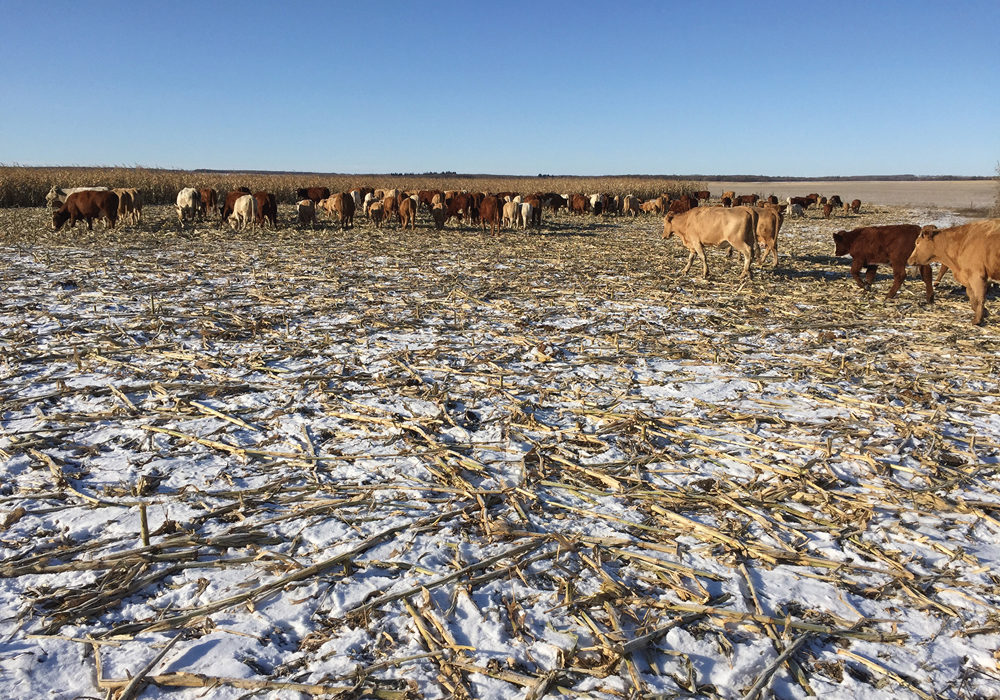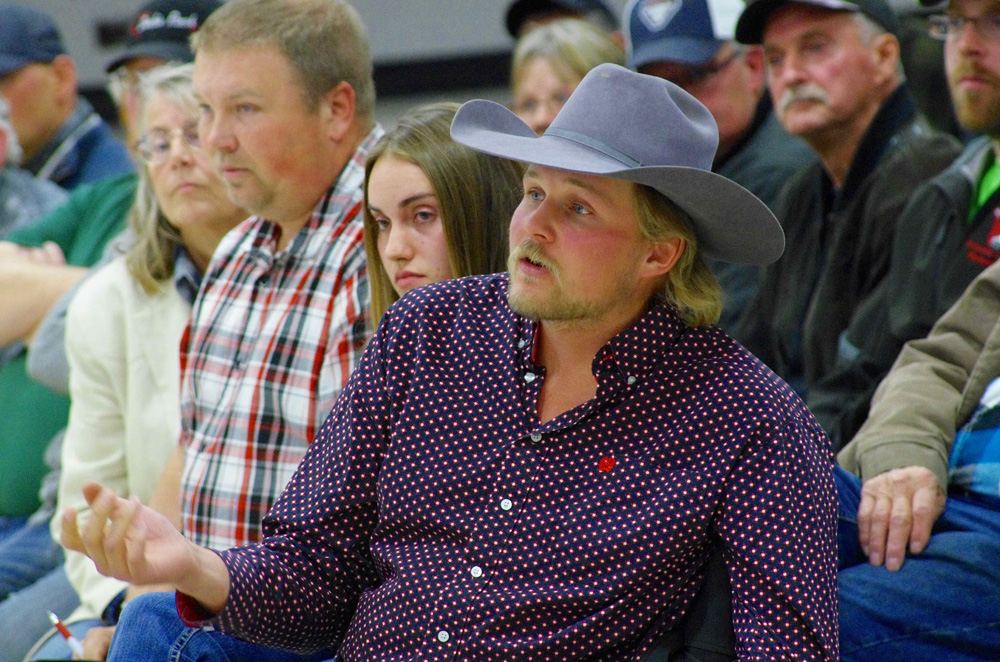Manitoba’s coming carbon tax must not hurt farmers or the governing Progressive Conservatives (PC) could face a new right-wing party next election.
Local farmer and PC supporter Danny Penner delivered that blunt message to Emerson MLA Cliff Graydon here at a carbon tax meeting March 30.
“I am disappointed in Brian Pallister and his government,” said Penner, while chairing the event attended by around 200 people, including farmers and farm suppliers.
“Cliff, Mr. Graydon, we need you to stand up for us in your caucus and say ‘stop being liberal-conservatives.’
“We waited so many years under a socialist government… and this leadership doesn’t seem to be wanting to stand up and do the right things by us. So let’s make sure that our views are known to them.
“We don’t want to be pushed to a point where we have to do what Saskatchewan did and create another right-wing party.”
Under the Paris agreement to mitigate climate change, Canada agreed to cut its greenhouse gas emissions 30 per cent from 2005 levels by 2030. To that end Ottawa says every province must have a $10-a-tonne price on carbon dioxide starting in 2018, rising to $50 by 2022. The revenue is the province’s. If a province refuses to bring in a plan, Ottawa will impose one.
Agriculture accounts for about 30 per cent of Manitoba’s carbon emissions. The rest is split between mainly home heating and transportation.
Penner and Somerset-area farmer Gerry Demare fears a carbon tax will add costs farmers can’t pass on.
Read Also

Canada’s interprovincial trade push makes for strange allies
Breaking down interprovincial trade barriers has become a national group project among Canada’s provincial governments, and that’s made for some strange alliances
A $30-a-tonne carbon tax will cost farmers an extra $25.38 an acre, based on applying 89.2 pounds of nitrogen per acre, Demare said, citing a story in Grainews based on information from University of Manitoba soil scientist Mario Tenuta.
However, that number is wrong, Tenuta said in an April 3 interview. The correct number is half that — $13.49 an acre. The reporter made an error converting Tenuta’s data from metric to imperial.
And of that, only $2.49 would come from taxing the natural gas used to make the nitrogen.
Manitoba Agriculture Minister Ralph Eichler says a made-in-Manitoba carbon price will not make farmers uncompetitive.
Demare says farmers could pay a carbon tax on inputs such as fuel, fertilizer, chemicals and transportation at the time of purchase, but would apply for a rebate as they do with the federal Goods and Services Tax (GST).
Tax on the carbon emitted by farmers would be “dealt with in the same manner… and settled at the same time…” said a paper Demare distributed.
Attendees were asked to sign a petition asking the government to implement the plan.
Demare said without a rebate the farm community can’t escape bearing the full brunt of the tax because unlike other industries it can’t pass on the increased costs to consumers either here at home or internationally.
If farmers’ profits fall they, their communities and the economies of Manitoba and Canada will suffer, he said.
“Any type of carbon tax that comes forward and lands at the feet of agriculture destroys it,” Demare said.
The plan, developed by about 90 farmers at a meeting in Bruxelles, Man., has been presented at several events around the province and more are planned.
“We are not stopping,” Demare said.
It’s unclear how much of the carbon tax will be passed on to farmers. Presumably, it will vary with competition.
The Keystone Agricultural Producers (KAP) wants farmers exempted from paying a tax on carbon emitted directly from farm production, which would include emissions from burning fossil fuels, applying fertilizer, as well as methane from livestock and manure storage.
However, KAP acknowledges farmers would likely pay carbon taxes indirectly when buying products such as nitrogen fertilizer because companies will pass it on if they can.
According to Demare a rebate is harder for a government to cut than an exemption.
But Graydon was critical of a rebate.
“I don’t believe there is any benefit in collecting (a carbon tax) and paying bureaucrats to send the money back,” Graydon told the meeting. “That’s job creation and it doesn’t benefit society. So in saying that think about what you want to put on paper and what you want to put in a letter or what you want to put on a website that you can live with.”
A rebate doesn’t fit with the government’s plan to cut red tape, KAP president Dan Mazier said in an interview March 31.
Mazier also doesn’t think the government will take one per cent from the eight per cent provincial sales tax and call it a carbon tax, which also was suggested.
Taxing carbon is to discourage emissions, which a sales tax doesn’t do, he said.
But Penner said Australia’s carbon tax, which it abandoned after three years, didn’t reduce carbon emissions and neither will Canada’s.
“If you need to appease Mr. Trudeau, here is an option,” Penner said, referring to Prime Minister Justin Trudeau’s championing of the policy.
Farmers already have a financial incentive to get the most out of their inputs, Penner added
“We have all bought technology to help us avoid overlap with sectional control shutoffs on our sprayers and fertilizer applicators,” he said.
Penner and Demare said they were disappointed David McLaughlin, the official getting feedback on a carbon tax for the Manitoba government, wasn’t present, even though his office said he would attend.
McLaughlin met with KAP, its commodity group representatives and Manitoba Beef Producers, March 31. Mazier praised the Manitoba government for seeking farmers’ views.
Not surprisingly there was some confusion about carbon taxation at the meeting, given plan details haven’t been announced.
“I’m sorry I don’t have all the answers you would like,” Graydon said.
The MLA said he would take what he heard to the legislature, but also urged people to write their MLAs.
“If you are throwing wet Kleenex at the wall to see what sticks that isn’t going to solve anything,” he said. “What you have to do is come up with what you think are solutions that you can live with.
“Saying that Mr. Pallister needs a backbone, that isn’t helping anything.”
Demare said if the public wants to mitigate climate change it must fund farmers to do so.
“If it doesn’t believe it wants to fund the benefits agriculture can bring forward, then this debate ends,” he said. “It doesn’t need to be talked about.
“The people should pay for what they actually want to move forward as an idea.”
KAP wants some of the carbon tax farmers will pay indirectly used to fund innovations to help farmers emit less carbon.
The Manitoba Forage & Grassland Association and Manitoba Beef Producers say forage and pasture sequester carbon and want incentives to encourage both.




















